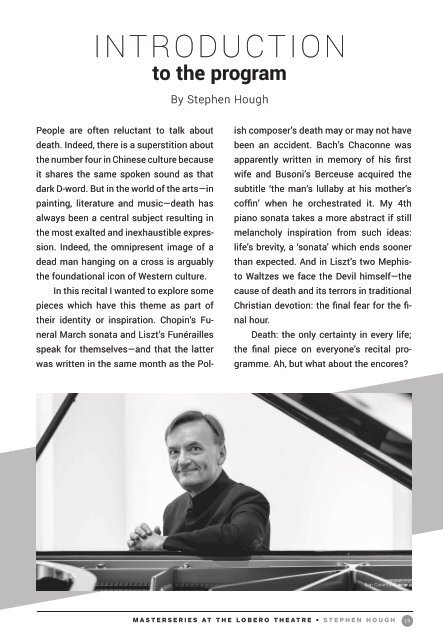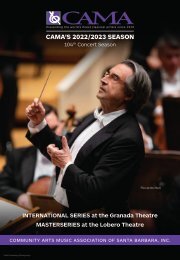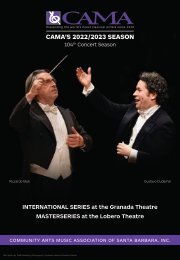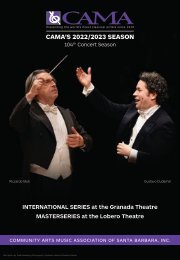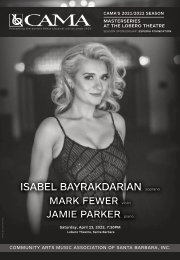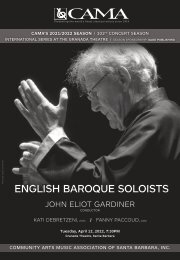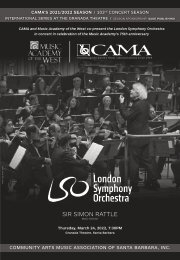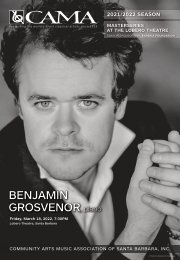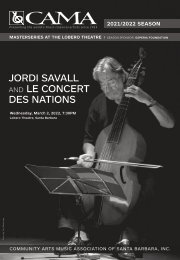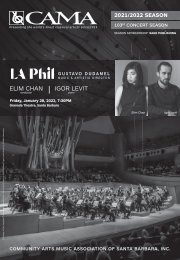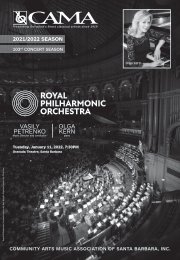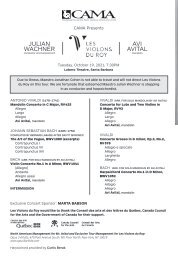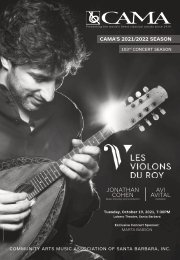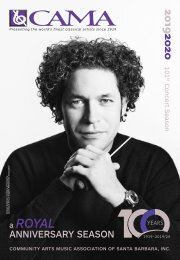October 29, 2019—CAMA's Masterseries—Stephen Hough, piano—Lobero Theatre, Santa Barbara, California
TUESDAY, OCTOBER 29, 2019, 8:00 PM CAMA's Masterseries at The Lobero Theatre Presents STEPHEN HOUGH piano CAMA’s 101st Concert Season opens appropriately with the return of the highly regarded British pianist Stephen Hough. Named by The Economist as one of 20 Living Polymaths (“a person of great and varied learning”), he is a true renaissance man—a leading concert pianist, writer, composer, teacher and painter who has won global acclaim for his outstanding interpretations of the piano repertoire and has continued to amass awards, accomplishments, and accolades, gracing many of the most important concert stages in the world in recital and appearing as soloist with the most renowned international orchestras. He was the first classical performer to be awarded a MacArthur (Genius) Fellowship. In 2014, Queen Elizabeth appointed him a Commander of the Order of the British Empire (CBE) for services to music. PROGRAM (on the theme of death...): J.S. BACH (arr. Busoni): Chaconne for Violin Solo, from Partita II for Violin, BWV 1004 (BV B 24) BUSONI: Berceuse élégiaque, Op.42 (BV 252a) CHOPIN: Sonata No.2 in B-flat minor, Op.35 HOUGH: Sonata No.4 (Vida Breve) LISZT: Funérailles, from Harmonies poétiques et religieuses (Poetic and Religious Harmonies), S.173 LISZT: Bagatelle sans tonalité, S.216a (Mephisto Waltz No.4) LISZT: Mephisto Waltz No.1, S.514 #####
TUESDAY, OCTOBER 29, 2019, 8:00 PM
CAMA's Masterseries at The Lobero Theatre Presents
STEPHEN HOUGH piano
CAMA’s 101st Concert Season opens appropriately with the return of the highly regarded British pianist Stephen Hough. Named by The Economist as one of 20 Living Polymaths (“a person of great and varied learning”), he is a true renaissance man—a leading concert pianist, writer, composer, teacher and painter who has won global acclaim for his outstanding interpretations of the piano repertoire and has continued to amass awards, accomplishments, and accolades, gracing many of the most important concert stages in the world in recital and appearing as soloist with the most renowned international orchestras. He was the first classical performer to be awarded a MacArthur (Genius) Fellowship. In 2014, Queen Elizabeth appointed him a Commander of the Order of the British Empire (CBE) for services to music.
PROGRAM (on the theme of death...):
J.S. BACH (arr. Busoni): Chaconne for Violin Solo, from Partita II for Violin, BWV 1004 (BV B 24)
BUSONI: Berceuse élégiaque, Op.42 (BV 252a)
CHOPIN: Sonata No.2 in B-flat minor, Op.35
HOUGH: Sonata No.4 (Vida Breve)
LISZT: Funérailles, from Harmonies poétiques et religieuses (Poetic and Religious Harmonies), S.173
LISZT: Bagatelle sans tonalité, S.216a (Mephisto Waltz No.4)
LISZT: Mephisto Waltz No.1, S.514
#####
Create successful ePaper yourself
Turn your PDF publications into a flip-book with our unique Google optimized e-Paper software.
INTRODUCTION<br />
to the program<br />
By Stephen <strong>Hough</strong><br />
People are often reluctant to talk about<br />
death. Indeed, there is a superstition about<br />
the number four in Chinese culture because<br />
it shares the same spoken sound as that<br />
dark D-word. But in the world of the arts—in<br />
painting, literature and music—death has<br />
always been a central subject resulting in<br />
the most exalted and inexhaustible expression.<br />
Indeed, the omnipresent image of a<br />
dead man hanging on a cross is arguably<br />
the foundational icon of Western culture.<br />
In this recital I wanted to explore some<br />
pieces which have this theme as part of<br />
their identity or inspiration. Chopin’s Funeral<br />
March sonata and Liszt’s Funérailles<br />
speak for themselves—and that the latter<br />
was written in the same month as the Polish<br />
composer’s death may or may not have<br />
been an accident. Bach’s Chaconne was<br />
apparently written in memory of his first<br />
wife and Busoni’s Berceuse acquired the<br />
subtitle ‘the man’s lullaby at his mother’s<br />
coffin’ when he orchestrated it. My 4th<br />
piano sonata takes a more abstract if still<br />
melancholy inspiration from such ideas:<br />
life’s brevity, a ‘sonata' which ends sooner<br />
than expected. And in Liszt’s two Mephisto<br />
Waltzes we face the Devil himself—the<br />
cause of death and its terrors in traditional<br />
Christian devotion: the final fear for the final<br />
hour.<br />
Death: the only certainty in every life;<br />
the final piece on everyone’s recital programme.<br />
Ah, but what about the encores?<br />
Sim Canetty-Clarke<br />
MASTERSERIES AT THE LOBERO THEATRE • STEPHEN HOUGH<br />
19


